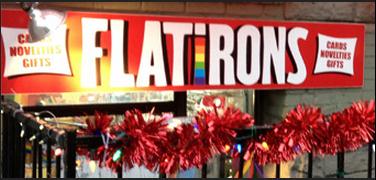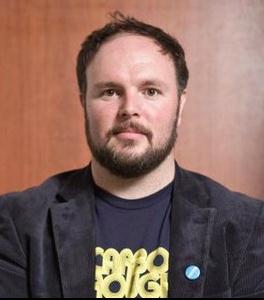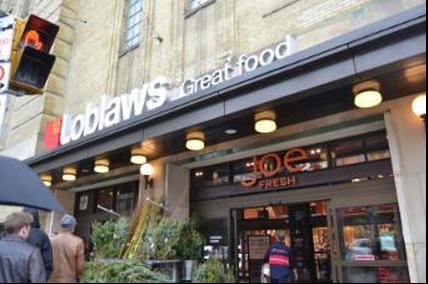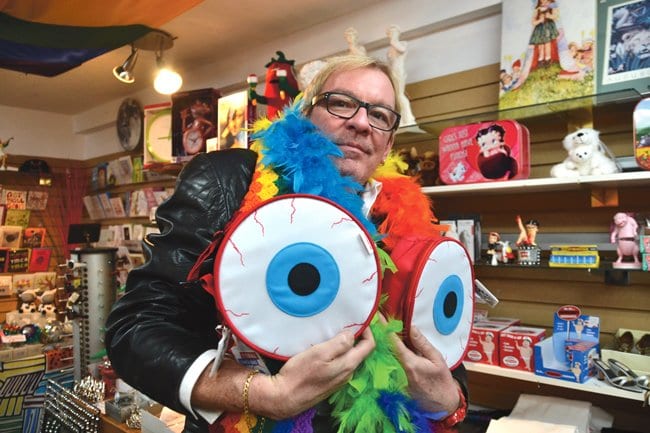
The Flatiron's Church Street location will close at the end of March. Credit: Andrea Houston

Matthew Blackett is the publisher of Spacing, a Toronto magazine that examines Canadian urbanism. Credit: Facebook

Loblaws opened in the former Maple Leaf Gardens on Nov 30, 2011. Credit: Facebook
After more than 20 years, the rainbow flags at Flatiron’s, a flamboyant and unabashedly gay Church Street gift shop, will soon fly no longer. The store is closing its doors in March.
Owner Ted Genova, who plans to maintain his St Lawrence Market location on Jarvis Street, says Church Street business has been terrible. He blames gentrification, high rents and an apathetic community that refuses to fight to keep the Village queer.
“The community doesn’t really support the stores on Church Street anymore, does it? Look at Loblaws. It’s full of gay people shopping. That’s why Pusateri’s is suffering, and other stores are going out of business . . . I can’t afford to stay there anymore.”
Twenty years ago, things were different, he says. Residents, activists and businesses worked together to fight for rights, define a sexual liberation movement, and carve out a space in Toronto to call their own.
Genova was president of the local business association at the time, years before it became the BIA. He remembers a time when putting up a rainbow flag on a business was an act of rebellion. He says the gay community fought hard to stake a claim on the Church Wellesley Village. Now it’s slipping away, he says.
“I’m the person who put the first rainbow flags on Church Street before there was a BIA,” he says. “I shepherded all that through. I love that community. I did a lot for that community, but that community does not support its businesses.
“I see it all changing now. We don’t have gay flags up on the street anymore . . . When we had flags up, it was beautiful. The sunlight would shine through them and it looked like San Francisco. It was a happening place. Now the street looks awful.”
Church Street has become a vastly different place from those early days of the gay rights movement. Today, gay and lesbian people are largely safe living out and proud and have spread into every corner of Toronto. Meanwhile, gentrification and the condo boom have also had a lasting effect on the Village.
Genova sees the problem as a loss of community. He has watched small and gay-owned businesses be forced out by increasingly high rents only to be replaced with corporate chains and franchises.
And the signals have been there for the past five years, he says. Reither’s German deli closed abruptly in March after 23 years and became David’s Tea. Zelda’s restaurant, which was for a long time seen as an anchor of the Village, moved to Yonge Street in 2009; its former home then stayed vacant for almost two years, only to reopen as Second Cup and Acme Burger. The Barn, another 20-year Church Street mainstay, cleared its dancefloor for the last time in August 2012.
“Something has happened to that street,” Genova says.
He admits the ongoing debate over whether the gay neighbourhood is dying is not new, but he insists the Village’s demise is a reality.
“Look at Reither’s. That was a wonderful store. But they just raised the rent so high it was astronomical. Now what have we got? We have a tea-house franchise. It’s fine, I guess, but it’s nowhere near as interesting as the store that was there before . . . Those franchises are ruining our community.
“I paid $3,000 a month for that stinky basement under Woody’s. It’s a joke. It’s more expensive than a condo at Harbour Castle,” he says.
Inside Flatiron’s, where all rainbow items are priced to clear, sales associate George Kozera remains upbeat. He prides himself on keeping the store’s Pride spirit going all year. He knows most customers by name and keeps dog treats behind the counter. He says he is sad to see the shop close. Sweeping through it, he says, “It’s like a drag queen exploded in here!”
Sadly, the St Lawrence Market location will sell only a fraction of the gay paraphernalia, including the raunchy greeting cards found in the Church Street store. Genova plans to focus more on selling his Christmas merchandise.
Matthew Blackett is the publisher, creative director and one of the founders of Spacing, an urban landscape magazine. He says the Village will probably always be gay, but the concern is that it will become “corporate gay.”
“It’s the same thing happening with Little Italy, which is also a neighbourhood in Toronto that is hugely gentrified,” he says. “If you take the Italian out of Little Italy, it isn’t Little Italy anymore. And I think it’s the same with the gay village. You need to protect those communities and foster the culture that surrounds it.”
Reg Lucas is the manager at the Church Street UPS store and a long-time Village local. He says the “gay identity” of the neighbourhood is slipping away, mainly because property owners are pricing community members out of their own community. “It’s sad,” he says. “I do believe the gay village will lose its identity, for sure. Eventually it won’t be called the ‘gay village’ anymore. It will just be the ‘Church Wellesley Village.’
“I think a lot of businesses are holding on until WorldPride in 2014 before relocating.”
David Wootton, manager of the Church Wellesley Village Business Improvement Area (BIA), agrees that Church Street rents are too high. He often says the Village is a victim of its own success. “I’d love to see more small, independent retail stores,” he has said. “Unfortunately, those small bric-a-brac gift stores just can’t afford to be on Church Street.”
But Liz Devine, president of Rainbow High Travel and co-chair of the BIA, says the rents on the strip have always been high compared to other downtown Toronto neighbourhoods.
“This is not a new thing. What is new, and is requiring a fair bit of adjustment, is that the buying habits of our community have changed,” she says. “There is far more competition than there used to be. More and more businesses are reaching out to the gay market. There is some really aggressive business marketing to LGBT people specifically.”
Devine admits that the Village is changing rapidly, like it or not. “Certainly, since Loblaws came into town, business throughout the Village is down. Every single business is impacted by Loblaws directly or indirectly.”
What’s happening on Church Street seems to be in keeping with other commercial markets in Toronto. Local real-estate firms are reporting that 2012 was a boom year for commercial properties, setting a record for both the number of deals done and the value of those deals.
Research firm RealNet Canada Inc found 1,984 asset sales of more than $1 million last year, for office, retail, hotel and industrial complex properties, The Globe and Mail reports. “These figures show the sector has undergone a speedy recovery in the last two years after transactions took a tumble in 2008, when credit dried up and companies were scaling back,” The Globe’s real-estate reporter Tara Perkins states.
John Kiru, the executive director of the Toronto Association of Business Improvement Areas, says the Church Wellesley Village is not an anomaly, noting that gentrification and soaring rents are a reality in every neighbourhood. Franchises and big-box chains are replacing small independent stores right across the city.
Kiru says the most recent commercial property-values assessment shows an average increase of 24 percent over four years from 2008, throughout Toronto. Neighbourhoods with BIAs are typically assessed higher, he says. “There are some BIAs out there that will be facing a 118 percent assessment increase. The Village is not one of them. The Village has good numbers, but they are nowhere near as much as what’s happening in other areas.”
Assessments are used for taxation purposes. If the value of the property goes up, so does the rent, Kiru says. The increasing value of the Village as a retail and commercial district is incredibly positive to the business community, he says, adding that this will inevitably have an effect on the cultural fabric of a neighbourhood. Kiru agrees with Blackett: “corporate gay” is fitting.
“As neighbourhoods become destinations for people and tourism, the corporate world recognizes their value,” he says.
While some property owners try to rent to small, independent merchants in an effort to ensure a business “fits” the neighbourhood, Kiru says, others don’t care about maintaining a specific cultural identity.
“[Some landlords] are just as content receiving their first and last months rent from a ‘triple A’ tenant, which these multi-nationals are, and you don’t have to worry about the rent coming in, or coming in late. There is two sides to the ledger.”
Ultimately, Blackett says, it’s up to the people who live in the Church Wellesley neighbourhood to fight to keep the Village queer and independent. “That’s what happened in Kensington. The community fought back,” he says. “Kensington took a strong stand against big-box stores coming in.”
That’s why it’s highly unlikely a Starbucks or McDonald’s will ever nudge its way into the market, he says. “Look at how fiercely that’s protected in Kensington. That could be a model for the Church Wellesley Village.
“That being said, neighbourhoods and cities are organic in many ways, and they do change,” he says. “In the last decade we have seen the gay community moving west along Queen to create a new gay neighbourhood there, queer west, and that’s really great to see.”
Some say goodbye, others say hello
It’s not all bad news in the Church Wellesley Village. Just next door to Flatiron’s, a new gay-owned organic coffee shop called Fuel recently opened its doors.
Gary Taylor, who opened the business with his partner in the former home of Sweet Lulu, wanted a career change. He says he grew tired of selling lip-gloss and eye shadow to teenaged girls at the Sephora store in the Eaton Centre — and his partner, Chester Wong, was just as weary in his job at the Apple Store.
“Cosmetics and technology are really not things either of us are very passionate about, but we are both really passionate about healthy eating,” he says. “This is a labour of love for us. And we live across the street, so we are really part of this community.”
Taylor even provides lockers at the back of the shop so local joggers can stash their valuables while they take part in neighbourhood running groups.
Fuel brews only coffee from 23 Degrees Roastery, an organic fair-trade company in North Toronto. Along with coffee, the smell of Taylor’s homemade ginger ale lingers in the shop. He wants to add sandwiches, salads and chili to Fuel’s menu.
“The whole idea for the shop is a friendly, healthy café with a community feel. It’s not completely organic, but pretty close,” he says. “And we are trying to keep the prices really low because we don’t believe that eating healthy should cost a premium.”
Further up the street, the York Medical Health Centre recently moved into Xtra’s former Church Street office. Stewart Watson, the medical professional liaison, says he has been gradually adding more doctors since the centre’s soft opening in October.
The clinic is a one-stop shop with the capacity to serve 20,000 patients. There’s no need for referrals to various specialists in different locations. In one visit, patients can visit their family doctor, see a massage therapist, get an X-ray and pick up a prescription at the pharmacy. There’s also a walk-in clinic, which includes a resuscitation room, cardiac testing, ultrasound, physiotherapy, full dental services and HIV specialists.
“[The owners] aren’t gay but are sensitive to the needs of this community, and they want to be involved in a non-offensive way,” he says. “They don’t see this clinic as strictly for the gay community. It is a Toronto community medical clinic. Obviously, gay and lesbian people should feel particularly safe here.”
Besides general practitioners, specialists, including a dermatologist, a cardiologist, a chiropractor and a chiropodist (foot care) are part of the staff. Watson expects 200 to 300 people to pass through the clinic’s doors each day. He says eventually the clinic will be open from 8am to 11pm, seven days a week.
By offering some urgent-care services, Watson hopes his medical centre will take some heat off the emergency room at St Michael’s Hospital. “If you break a bone, and it’s not sticking out, we can fix it,” he says. “If [the bone] is sticking out, you gotta go to St Mike’s.”
Elsewhere in the Village, other merchants have been busy with renovations and location changes. Baskin Robbins, which was closed for nine days while it completed renovations, reopened on Jan 15. Super Freshmart, the 24-hour store that is the largest independent grocer in the Church Wellesley Village, will reopen in February.
Rainbow High Travel has moved across the street to a more prominent location at 449 Church St. Company president Devine says the business was in its previous location for almost 20 years.
“As the street became more animated over the years, we became more and more invisible where we were,” she says. “We now have a huge window, and we have lots of plans to engage people on the street.”
Find the York Medical Health Centre on Facebook or call 416-463-1500.

 Why you can trust Xtra
Why you can trust Xtra


